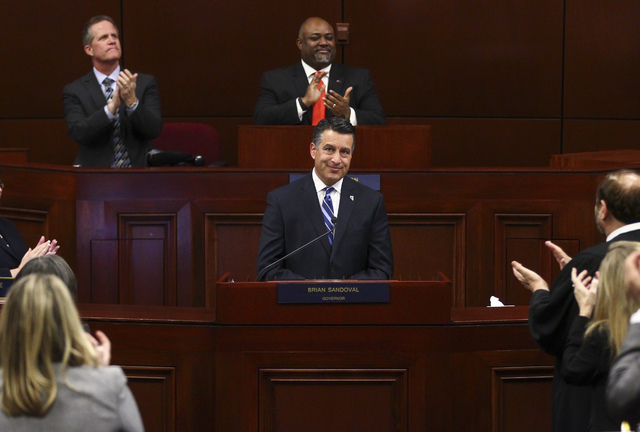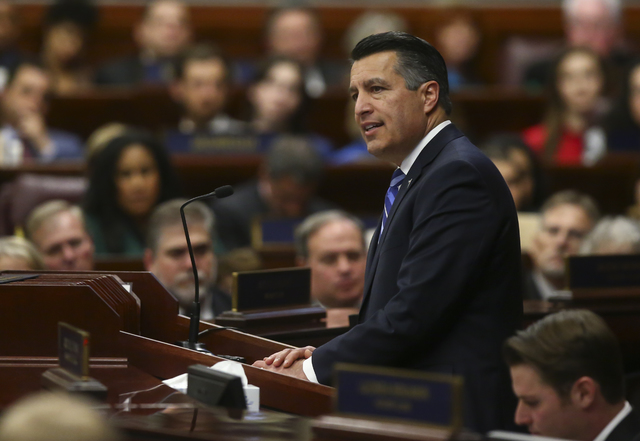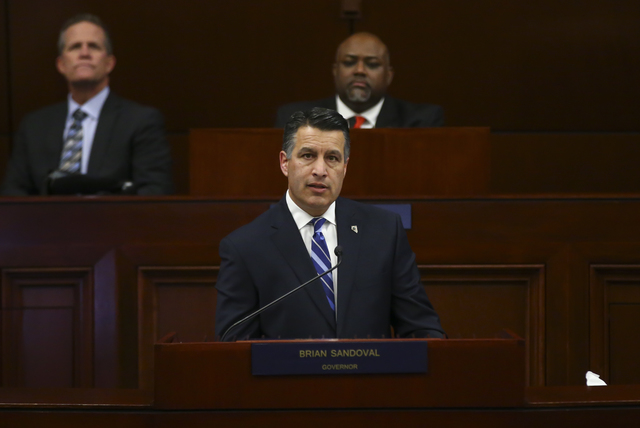Governor’s marijuana tax proposal has some worried black market will thrive in Nevada
Gov. Brian Sandoval wants a special tax on recreational marijuana sales to boost his budget, but state lawmakers and industry executives are concerned that his proposal might be too high.
The worry, they say, is that if the taxes on recreational sales balloon too much and prices get too high, some Nevadans might forgo the legal market altogether.
Sandoval announced during Tuesday’s State of the State address that his proposed two-year budget calls for a 10 percent special tax on the retail sales of marijuana, which he expects will generate $70 million to go towards public education.
But lawmakers like Sen. Patricia Farley, I-Las Vegas, say they’re worried the tax, on top of the 15 percent wholesale tax, could lead to Nevada mirroring one of the biggest issues of Colorado’s legalization effort: a still-thriving black market.
“It’s a very price-sensitive product. We just have to be really mindful that we don’t create a black market,” Farley said.
In Colorado, the first state to allow the sale of recreational marijuana, the street price of illegally sold marijuana can be half that of the legal recreational product. And plenty of folks have been willing to risk the illegal buy, according to police in the state.
Farley’s worries are echoed by those in the marijuana industry.
“If you overtax it, people are going to go back to the black market, avoid paying taxes, avoid everything,” said Andrew Jolley, CEO of The Source marijuana dispensaries. “It’s a delicate balancing act that we need to handle carefully, so we do what’s in the best interest of Nevadans and our education system.”
But not everyone is down on the proposal.
State Sen. Tick Segerblom, D-Las Vegas, said the tax proposal signals that the governor is ready to move forward with legalization, despite Sandoval opposing the ballot measure before the election.
“He’s on board with getting it going. It’s really exciting,” Segerblom said.
The proposal also gave Segerblom hope that recreational sales in Nevada could start sooner than later by seeing no resistance from the governor’s office, and the state could begin reaping the revenue benefits from the new industry.
“Let’s get it out early. Start churning out the revenue,” Segerblom said.
Like Sandoval, Colorado Gov. John Hickenlooper was critical of legalizing marijuana in his state, but he put up no fight to stop it. In recent months, though, Hickenlooper has said the legalization effort is working in Colorado.
Question 2, passed by Nevada voters in November, places a 15 percent tax on the wholesaling of recreational cannabis, which is then passed on to the consumer. Recreational sales, which aren’t expected to start until June or later, are also subject to the regular sales taxes levied by the state and individual municipalities. Sandoval’s proposal will need to be approved by the Legislature, which begins its 2017 session next month.
Should that be adopted, Nevada’s taxes on recreational marijuana sales would mirror the Colorado model.
Colorado collected $44 million in the first full year of sales in 2014, well below the projected $70 million. But by 2015, the state collected $76 million in marijuana taxes. And that revenue eclipsed more than $102 million through the first 11 months of 2016, according to data from the Colorado Department of Revenue.
Derek Peterson, CEO of Terra Tech Corp., which operates marijuana dispensaries and growing facilities in California and Nevada, said the additional taxes could make it burdensome to operate and reinvest into the industry when combined with other financial issues the industry faces. Peterson pointed specifically to the fact that the Federal Income Tax Code prevents marijuana companies from deducting expenses from their income, because the drug is federally illegal, which takes a large cut out of their bottom line.
But Peterson said there is time to negotiate the tax proposal, and he is hopeful the two sides can settle somewhere in the middle.
“Fortunately, Nevada is an entrepreneurial-friendly state and has a strong background in regulating markets,” Peterson said. “We hope we can find a happy medium that allows both our communities and business people to benefit for this fast-growing industry.”
Contact Colton Lochhead at clochhead@reviewjournal.com or 702-383-4638. Follow @ColtonLochhead on Twitter.
POT NEWS
Click here for complete coverage of marijuana issues in the Las Vegas Review-Journal
























